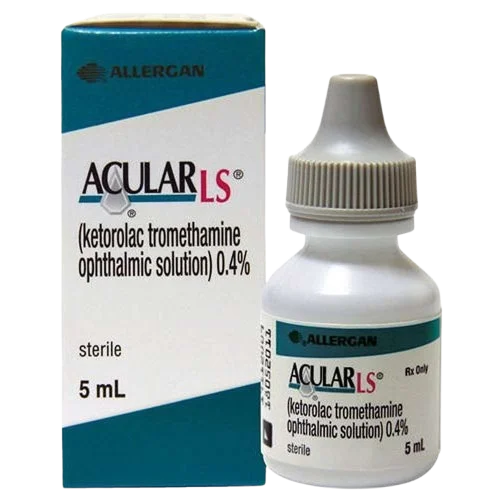It is safe for short-term use after eye surgery without the risks of prolonged steroid exposure. A Fast-Acting Pain & Inflammation Relief blocks prostaglandins, the chemicals responsible for eye pain, redness, and swelling, and provides quick relief within hours after application. It is effective for Post-Surgical Recovery (Cataract & LASIK Surgery). Doctors use it after cataract surgery, LASIK, or other eye procedures. It reduces pain and inflammation. It helps prevent macular edema (swelling in the retina) post-surgery. It treats Seasonal Allergic Eye Itching (Off-Label Use). Proven to relieve eye itching caused by seasonal allergies (allergic conjunctivitis). Acular is a non-drowsy alternative to oral painkillers and provides local pain relief without the drowsiness or systemic side effects of oral NSAIDs like ibuprofen. It is FDA-Approved & Clinically tested, backed by research, and approved for treating post-surgical eye inflammation and pain.
What is Acular Eye Drop?
Acular (Ketorolac Tromethamine 0.5%) is a non-steroidal anti-inflammatory drug (NSAID) that works by blocking pain and inflammation in the eye. Used widely to relieve eye pain, redness, swelling, and itching, especially after surgery or because of allergies.
Mechanism of Action: How Acular Works
Blocks Prostaglandins (Pain & Inflammation Chemicals)
Prostaglandins are natural chemicals that cause pain, swelling, and redness in response to injury, surgery, or allergies. Acular inhibits cyclooxygenase (COX-1 and COX-2) enzymes needed to produce prostaglandins. Acular eye drops reduce inflammation, swelling, and pain in the eye by blocking prostaglandin production.
Provides Localized Pain Relief without Affecting the Whole Body
Unlike oral NSAIDs (e.g., ibuprofen), Acular works directly in the eye, providing fast relief with fewer systemic side effects. It helps reduce the need for oral pain medications after eye surgery or procedures.
Reduces Post-Surgical Swelling & Prevents Macular Edema
After cataract or LASIK surgery, inflammation can cause swelling in the retina (macular edema). Acular reduces the risk of post-surgical swelling, leading to a smoother recovery and better vision outcomes.
Relieves Eye Itching from Seasonal Allergies
Acular also blocks the inflammatory response triggered by allergens like pollen or dust, helping to reduce itching and discomfort.
How Long Does It Take to Work?
- Pain relief begins within a few hours of applying the drops.
- Inflammation reduction is noticeable within 24–48 hours.
- Full effects typically occur within a few days, depending on the severity of the condition.
Acular does NOT treat infections—it only relieves pain and inflammation. Always use it as prescribed by your doctor!
What are the Uses and Benefits of Acular Eye Drops?
Uses of Acular Eye Drops
Post-Surgical Eye Pain & Inflammation (Primary Use)
- Used after cataract surgery, LASIK, or other eye procedures to reduce pain, swelling, and redness.
- It helps prevent macular edema (swelling in the retina) post-surgery, improving vision recovery.
Seasonal Allergic Conjunctivitis (Eye Itching Due to Allergies) (Off-Label Use)
- Effectively relieves eye itching and discomfort caused by seasonal allergies.
- Blocks prostaglandins, reducing the inflammatory response to allergens.
Corneal Injury-Related Pain (Off-Label Use)
- Used to reduce eye pain and discomfort caused by minor corneal injuries or irritations.
Alternative to Steroid Eye Drops
- It provides strong anti-inflammatory effects without the side effects of steroids, such as increased eye pressure (glaucoma) or cataract formation.
Benefits of Acular Eye Drops
- Potent Pain & Inflammation Relief–Works quickly to reduce swelling, pain, and discomfort.
- Non-Steroidal, Safer for Long-Term Use–Unlike steroids, Acular does not raise intraocular pressure (IOP) or cause glaucoma/cataracts.
- Fast Recovery After Eye Surgery–Reduces post-surgical swelling and helps protect vision.
- Effective for Allergy-Related Eye Itching–Provides long-lasting relief from seasonal eye allergies.
- Non-Drowsy Alternative to Oral Painkillers–Offers localized pain relief without the side effects of oral NSAIDs like ibuprofen.
- FDA-Approved & Clinically Tested–Proven, safe, and effective for treating post-surgical eye inflammation and pain.
What are the Safe Dosages of Acular Eye Drops?
Standard Dosage for Common Conditions
Post-Surgical Eye Inflammation & Pain (After Cataract Surgery)
Dosage: Instil 1 drop, four times daily, in the affected eye(s).
It starts 24 hours before surgery and continues for up to 2 weeks after surgery.
Seasonal Allergic Conjunctivitis (Eye Itching because of Allergies) (Off-Label Use)
Dosage: 1 drop four times daily in each affected eye.
Use it for up to 2 weeks or as prescribed.
Corneal Injury or Other Eye Pain (Off-Label Use)
Dosage: 1 drop every 6–8 hours, as needed, for pain relief.
Duration: Usually up to 4 days, depending on severity.
Important Usage Instructions
- Shake the bottle well before use.
- Use it only as prescribed. Do not exceed the recommended dose.
- Wait at least 5 minutes before using other eye drops.
- Avoid wearing contact lenses while using Acular Generic unless advised by your doctor.
- Store at room temperature and keep the bottle tightly closed.
Warning
Do not use Acular for over 2 weeks unless directed by a doctor—long-term NSAID use may cause corneal problems. If symptoms worsen or do not improve, seek medical help immediately.
How to take Acular Eye Drops?
Step-by-Step Guide to Applying Acular Eye Drops
Wash Your Hands
Clean your hands with soap and water to prevent infections.
Shake the Bottle Well
If using Acular Eye Drops suspension, shake the bottle gently before each use.
Tilt Your Head Back & Pull Down Your Lower Eyelid
Tilt your head backward gently and pull down the lower eyelid to create a small pocket.
Hold the Dropper Above the Eye
Position the bottle close to your eye, but do not touch it to prevent contamination.
Instill the Drops
Squeeze one drop into the lower eyelid pocket as prescribed.
Close Your Eyes & Apply Gentle Pressure
Close your eyes for 1–2 minutes and press lightly on the inner corner of your eye (near the nose) to prevent drainage into the throat.
Wipe Excess & Avoid Blinking Too Much
Use a clean tissue to wipe off any excess liquid. Do not rub your eyes.
Wait Before Using Other Eye Medications
If using multiple eye drops, wait at least 5 minutes before applying the next one.
Additional Tips for Safe Use
- Use it only as prescribed. Do not exceed the recommended dose.
- Do not wear contact lenses while using Acular Generic unless advised by your doctor.
- Avoid touching the dropper tip to prevent contamination.
- Store at room temperature and keep the bottle tightly closed.
Important
- If you miss a dose, apply it as soon as possible. If it is close to your next dose, skip the missed dose. Do not double up to catch up.
- If symptoms worsen or do not improve within a few days, consult your doctor immediately.
When Should I Avoid Acular Eye Drops or Use Acular Eye Drops Cautiously?
When to AVOID Acular (Do NOT Use If You Have These Conditions)
Allergy to Ketorolac or NSAIDs (Non-Steroidal Anti-Inflammatory Drugs)
If you are allergic to Ketorolac, aspirin, ibuprofen (Advil), naproxen (Aleve), diclofenac, or other NSAIDs, avoid Acular eye drops. It may trigger severe allergic reactions.
History of NSAID-Induced Asthma or Severe Allergic Reactions
If NSAIDs have caused breathing problems, hives, or swelling of the face/throat in the past, Acular may trigger a similar reaction.
Recent or Active Eye Infections
Acular does not treat bacterial, viral, or fungal eye infections and may worsen symptoms if you use it without antibiotics.
Bleeding Disorders or Recent Eye Surgery with High Bleeding Risk
Acular Eye Drops can increase bleeding risks, especially after eye surgery, injury, or in people with clotting disorders.
Corneal Issues (Corneal Ulcers, Corneal Thinning, or Slow Healing Wounds)
Long-term NSAID use may slow corneal healing, increasing the risk of damage or perforation.
Children Under 2 Years Old
Doctors do not recommend Acular eye drops in infants. One should only use it in children if prescribed by a doctor.
When to Use Acular Cautiously (Only Under Doctor’s Supervision)
Dry Eye Syndrome or Chronic Eye Irritation
Acular may cause temporary eye dryness—use with caution if you already have severe dry eyes.
Glaucoma or High Eye Pressure (IOP)
Though Acular does not increase IOP like steroids, people with glaucoma should still use it under medical supervision.
Prolonged Use (More than 2 Weeks)
Long-term use of Acular may increase the risk of corneal damage or slow healing—use for only as long as prescribed.
Pregnancy & Breastfeeding (Use Only If Necessary)
You should avoid Acular eye drops as they may affect fetal circulation. If you are pregnant or nursing, consult your doctor before use.
Wearing Contact Lens
Avoid using Acular Eye Drops while wearing contacts unless your doctor allows it—NSAIDs may cause irritation or discomfort when combined with lenses.
What are the Side effects of Acular Eye Drops?
Acular Eye Drops is safe, but some users may experience mild-to-moderate side effects. Most of these effects are temporary and resolve as your eyes adjust to the medication.
Common Acular Eye Drops Side Effects
- Mild Eye Irritation or Burning Sensation–A slight stinging or discomfort may occur right after application.
- Blurred Vision–Temporary blurriness immediately after applying the drops, usually clears within minutes.
- Eye Dryness or Watery Eyes–Some users may experience temporary dryness or excessive tearing.
- Light Sensitivity (Photophobia)–after using the drops, you may feel more sensitive to bright lights.
- Eye Redness or Mild Swelling–Some irritation or redness may occur, especially in the first few days of use.
Severe Acular Eye Drops Side Effects
- Severe Allergic Reactions (Anaphylaxis or Hypersensitivity)
- Severe Eye Pain, Redness, or Swelling
- Corneal Damage, Thinning, or Ulcers
- Vision Changes or Sudden Vision Loss
- Increased Eye Bleeding (Post-Surgical Patients at Higher Risk)
- Worsening or Persistent Eye Infection Symptoms





